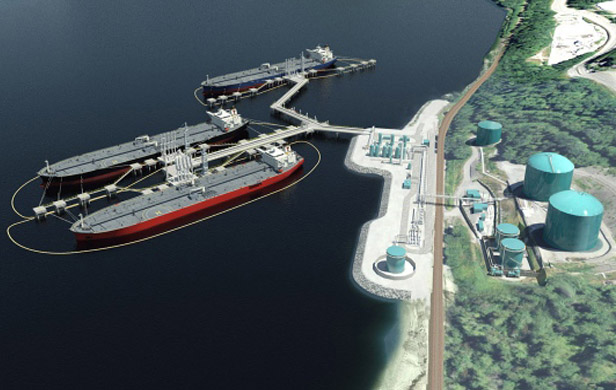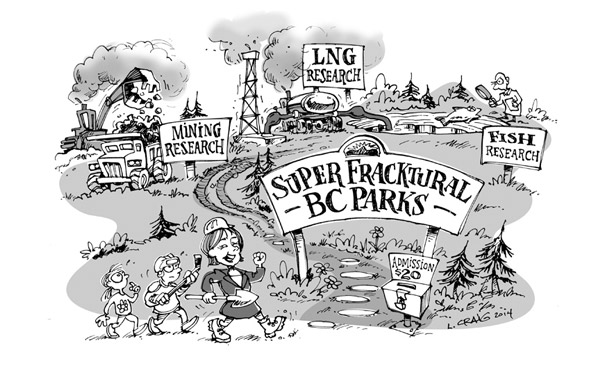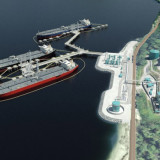
Republished from The ECOreport.
There have been complaints about the flawed National Energy Board (NEB) Hearings, on the proposed Trans Mountain Expansion Project (TMEP), from the beginning. Former BC Hydro CEO Marc Eliesen withdrew last fall, calling the proceedings “a farce and this Board truly a industry captured regulator.” When former ICBC President and CEO Robyn Allan left, last May, she said the panel is “not an impartial referee…the game is rigged.” This morning, another 35 participants left the NEB hearings.
Abandoning ship
Two are representatives of environmental organizations, the other 33 are private individuals.
Peter Wood, from the BC Chapter of the Canadian Parks and Wilderness Society (CPAWS BC), said he wouldn’t be surprised if more intervenors and commenters leave.
He wanted to stress the positive side of today’s events, “We believe there is more room for an independent evaluation. A made in B.C. process where we have some sense of transparency, where we actually see what is going and the intervenors get a chance to ask the proponents questions. Right now, we are not able to do (this). We also want a process that considers the full scope of the project.”
“Lets talk about Climate Change. Lets talk about the impact the Tar Sands have on Alberta. We consider all of these things part of the whole project.”
Climate change ignored
These were similar to the issues the city of Vancouver raised with the NEB, in February 2014. Around 95% of its economy is “non-resource based.” Vancouver is “a leader in sustainable development,” the city noted.
[quote]The local economy depends on Vancouver’s reputation for sustainability to attract businesses, professionals and other workers…Vancouver has a responsibility for planning and mitigating impacts of severe weather events and rising sea levels…[/quote]
The City of Burnaby had also expressed concerns about the proposed pipeline’s failure to describe “…design elements that incorporate the broader effects of climate change…”
Eoin Madden, from the Wilderness Committee, added that “financial benefits of development of oil sands and oil transportation are front and centre of the TMEP hearings, and that other socioeconomic and environmental impacts are expressly excluded…”
“The fact they have been ignoring Climate impacts is to all of our detriment. Why would we want to lock ourselves into an outdated, dangerous infrastructure when clean and healthy alternatives exist,” said Larissa Stendie, who is not an intervener, but whose organization (Sierra Club BC) has been watching the NEB process closely.
Pipelines through provincial parks

Another concern is that the proposed pipeline route goes through five provincial parks.
“This violates all the values these parks were created for. Why are we even considering that?” asks Wood.
Kinder Morgan was conducting research in some of those parks before the provincial government introduced Bill 4 last March.
Wood said, “The permits Kinder Morgan was operating under were issued before the legislation that authorized the province to do so. So the question is, were new permits issued? We can’t find out that information.”
(This is one of several questions the ECOreport has asked the Ministry of Environment.)
The boundary adjustment process is already at a “very advanced at stage” at Bridal Veil Falls, near Chilliwack, and in the Lac Du Bois Grasslands Protected Area, northwest of Kamloops.
Prioritizing industry over public interest
Madden’s name topped the list of those who left the process today and in a press release he explained, “It’s a sad day for us. The federal government has altered the pipeline approval process so that Canadians no longer have a proper say on these major industrial projects. What we’re left with is a broken system that prioritizes industry over the public interest.”
The 35 departing intervenors and commenters sent the NEB a joint letter of resignation, in which they said:
[quote]“The review has discounted and devalued expert evidence, most specifically the knowledge of the lands and territories the pipeline will pass through, and the likely impact it will have on our waters and salmon. It has under-resourced Nations and Bands, thereby ensuring an unbalanced and ill-informed hearing,” they said in a prepared statement.
“By ignoring the impact the Project could have on our climate, any findings of the review will be fundamentally incomplete. If constructed, the Project will have massive climate change ramifications. The exclusion of any discussion on the climate impacts of the Project from the hearings is a gross failure of public responsibility.”
“The vast majority of concerned citizens, groups and Nations have been shut out of the review. Those lucky enough to secure participation in the review have been deprived of the right to cross-examine Trans Mountain. Participants have repeatedly requested Trans Mountain address a range of issues which Trans Mountain has successfully avoided answering. The review has lost all semblance of a due process.”[/quote]
BC should conduct its own review
They sent the Government of BC a copy of that notice and Wood said he hopes it will initiate a conversation. The province has previously expressed concerns and “has every reason to have a fair say in the process and conduct their own review.” They would shoulder a great deal of risk from the proposed pipeline, “and derive very little benefit.”
As regards the parks, the Minister does not have to allow that project to proceed to the public consultation pored. “If the Minister decides the values for which that park was proposed are inconsistent with those for which the park was created, she has the power to dismiss it outright.”
Allan: govt not protecting public
So far, the province has shown little inclination to have its own environmental assessment.
“One of the major reasons I applied as an intervenor is the serious concern I had that our provincial government was not protecting the public interest,” former ICBC CEO Robyn Allan told the National Observer last month. “If an intervenor does not ask questions, then the intervenor is saying they accept the evidence as provided by the proponent as non-contested.”
At that point, Vancouver had sent in 171 queries, Burnaby 132, and the province 23.
Another of the ECOreport’s as yet unanswered questions to the Ministry is whether BC is willing to withdraw from the NEB process and have its own environmental assessment.
Demonstration planned
Sierra Club BC will soon be sending out an invitation to a creative demonstration at Vancouver’s English Bay Beach: 10:30 AM, Sunday, August 16.
“It will be a theatrical opportunity to discuss and dramatize some of the potential health risks posed by tankers plying those waters, ” said Stendie.


Roy Hales has truly shown that any Environmental Review on the Kinder Morgan Pipeline Project that is ruled on by the NEB that has become practicaly a partner– is reduced to a farce and without merit. That the NEB has barred hundreds of Intervenors with legitimate concerns, and refuses to answer ONE HUNDRED AND SEVENTY ONE legitimate questions from the City of Vancouver that will be directly affected by any disasterous effects this Project causes within its jurisdiction–proves the NEB unfit for the task. That it likewise refuses to answer 0NE HUNDRED AND THIRTY TWO legitimat queries from the City of Burnaby—a sitting duck for any disaster concerning the PIpeline and its storage tanks above the city– further shows it has no business running the show. And its refusal to answer 23 queries even from the compromised Province, should seal its fate as an entity to be taken seriously. It is obvious that a huge amount of money, time, science, personal effort and integrity and knowledge that should be factored into this project—is being spent in vain, and that the whole Kinder Morgan/ NEB expansion project is as dangerous as a ticking bomb for all we know, and likely by the NEB and Kinder Morgan as well. Nothing has been resolved as to its safety and legitimacy, and consequently the whole project is environmentally, physcally, mentally, spiritually and fiscally unfit to proceed. Period.
We can’t blame those that gave up on NEB’s Kinder Morgan review. How long can you play along that the review is legit? NEB, KInder and Government are like three peas in a pod.
“Vancouver’s economy is not resource based”? What do they build houses with down there? Or make concrete with. Any corporate headquarters for any forestry mining or oil companies there? What do their vehicles run on, or airplanes? We are all living in resource based economies.
Your simplified statement lacks detail regarding cause and effect. Perhaps a in depth discussion would allow a more thorough understanding of resource extraction and use.
Robert Taylor’s comment re: “we are all living in resource based economies” is far from a “simplified” “understanding of resource extraction and use”.
Anyone that believes just because we aren’t mining, logging, fishing, farming, canning, milling or refining in Vancouver, or any other major city, we don’t have direct connections to those industries and the resources they depend upon is ignoring reality.
Modern industrialized, capitalist civilization (epitomized by big city life) is unsustainable. Cities are monstrous black holes sucking in equally monstrous quantities of resources … so-called renewables and non-renewables. They cannot continue to exist under the current capitalist endless-growth and development paradigm.
To pretend we can compartmentalize humanity’s existence into neat, discrete, non-interrelated spheres is exactly what folks like Trans Mountain and Kinder Morgan want: externalization of the consequences of their behaviour and avoiding the holistic, big-picture perspectives makes their job a whole lot easier.
You can find the source of that 95% statistic in the article, follow the link to the city of Vancouver’s questions to the National Energy Board. Use the “find” feature on your computer to locate it.
If you want to oversimplify matters, you could argue that making wooden chairs is “resource based.”
In reality, most of the jobs connected to this (design, assembly & transportation of the various components, manufacturing the various chemicals, manufacturing the chair, delivering the chair to wholesale and retail outlets etc) are subsequent to cutting down trees (which is a resource based industry).
I believe the city of Vancouver was taking this a step further, they were saying that 95% of their economic activity is non resource based. I haven’t seen the stats, but they are probably referring to things like the service sector, transportation, computer related industries, film etc etc.
I don’t believe there are any sawmills, or canneries within the city anymore and even if there were they would probably be covered by the 5% of the economy the city mentions. So would the headquarters of resource based companies.
But to really put this in context, the city of Vancouver was making this remark when questioning Kinder Morgan about the proposed Trans Mountain Pipeline Expansion. That carries raw bitumen to Burnaby, where it is loaded onto tankers and shipped through Burrard Inlet to overseas destinations. Vancouver derives little, if any, benefit and a great deal of risk.